英语礼貌用语范文
礼貌用语,不说脏话英语作文
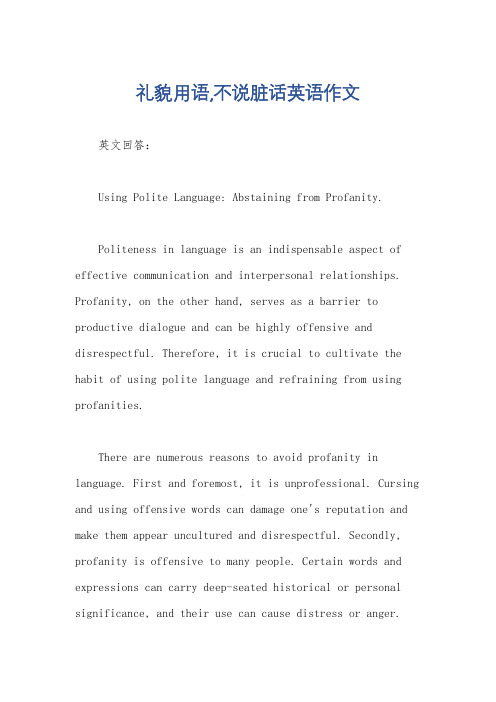
礼貌用语,不说脏话英语作文英文回答:Using Polite Language: Abstaining from Profanity.Politeness in language is an indispensable aspect of effective communication and interpersonal relationships. Profanity, on the other hand, serves as a barrier to productive dialogue and can be highly offensive and disrespectful. Therefore, it is crucial to cultivate the habit of using polite language and refraining from using profanities.There are numerous reasons to avoid profanity in language. First and foremost, it is unprofessional. Cursing and using offensive words can damage one's reputation and make them appear uncultured and disrespectful. Secondly, profanity is offensive to many people. Certain words and expressions can carry deep-seated historical or personal significance, and their use can cause distress or anger.Additionally, excessive use of profanity can undermineone's message. Instead of emphasizing the substance of the conversation, it can distract the listener and diminish the intended impact.Using polite language, in contrast, fosters positive relationships and facilitates effective communication. When we speak with courtesy and respect, we convey that we value the other person's feelings and perspectives. This creates a welcoming atmosphere, encourages open dialogue, and promotes mutual understanding. Moreover, polite language reflects well on the individual using it. It demonstrates self-control, maturity, and an appreciation for the power of words.Replacing profanity with appropriate language is askill that can be developed through practice. When the urge to use a curse word arises, pause and take a moment to consider alternative options. There are many creative and impactful ways to express oneself without resorting to vulgarity. In formal settings, it is best to use standard and neutral language. In informal conversations, it isacceptable to use slang or colloquialisms, but these should be employed in moderation and with consideration for the audience.In summary, avoiding profanity and using polite language is essential for maintaining respectful and effective communication. Not only does it prevent offense and damage to reputation, but it also promotes positive relationships and demonstrates personal maturity. By making a conscious effort to abstain from profanity, we cultivate a respectful and inclusive environment for all.中文回答:礼貌用语,不说脏话。
礼貌英语单词
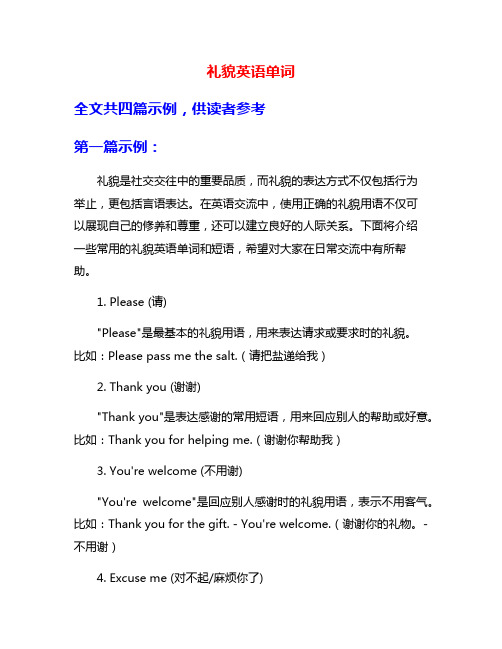
礼貌英语单词全文共四篇示例,供读者参考第一篇示例:礼貌是社交交往中的重要品质,而礼貌的表达方式不仅包括行为举止,更包括言语表达。
在英语交流中,使用正确的礼貌用语不仅可以展现自己的修养和尊重,还可以建立良好的人际关系。
下面将介绍一些常用的礼貌英语单词和短语,希望对大家在日常交流中有所帮助。
1. Please (请)"Please"是最基本的礼貌用语,用来表达请求或要求时的礼貌。
比如:Please pass me the salt.(请把盐递给我)2. Thank you (谢谢)"Thank you"是表达感谢的常用短语,用来回应别人的帮助或好意。
比如:Thank you for helping me.(谢谢你帮助我)3. You're welcome (不用谢)"You're welcome"是回应别人感谢时的礼貌用语,表示不用客气。
比如:Thank you for the gift. - You're welcome.(谢谢你的礼物。
-不用谢)4. Excuse me (对不起/麻烦你了)"Excuse me"可以用来道歉、请求别人让开或引起别人的注意。
比如:Excuse me, can I ask you a question?(不好意思,我可以问你一个问题吗?)5. I'm sorry (对不起)"I'm sorry"用来道歉或表达遗憾。
比如:I'm sorry for being late.(对不起,我迟到了)6. Pardon me (请原谅我)"Pardon me"可以用来请求别人将某事原谅或再次解释。
比如:Pardon me for my mistake.(请原谅我的错误)7. May I...? (我可以……吗?)"May I...?"是礼貌地请求别人允许的方式。
英语回邮件的礼貌用语范文

英语回邮件的礼貌用语范文Subject: Gracious Acknowledgement of Your EmailDear [Recipient's Name],Warmest greetings from [Your Name] at [YourCompany/Position]! I hope this message finds you in the best of health and high spirits. It is with great pleasure that I respond to your recent email, and I would like to extend my heartfelt appreciation for your valuable time and consideration.Firstly, I must express my sincere gratitude for the information and insights you have shared. Your perspective has been incredibly enlightening, and I am eager to explore the possibilities it presents for our ongoing collaboration.In regards to your queries, I have taken the necessary steps to address each point with the utmost diligence. Rest assured, your concerns are of the highest priority, and I am committed to providing you with a comprehensive and well-considered response.Should there be any additional details you require, or if further clarification is needed, please do not hesitate to reach out. Your satisfaction is of paramount importance, and I am more than willing to assist in any way possible.I look forward to our continued correspondence and the fruitful discussions that are sure to follow. Thank you once again for reaching out, and I eagerly anticipate your next communication.Warm regards,[Your Full Name][Your Position][Your Company][Your Contact Information]。
英语作文中礼貌的问候语
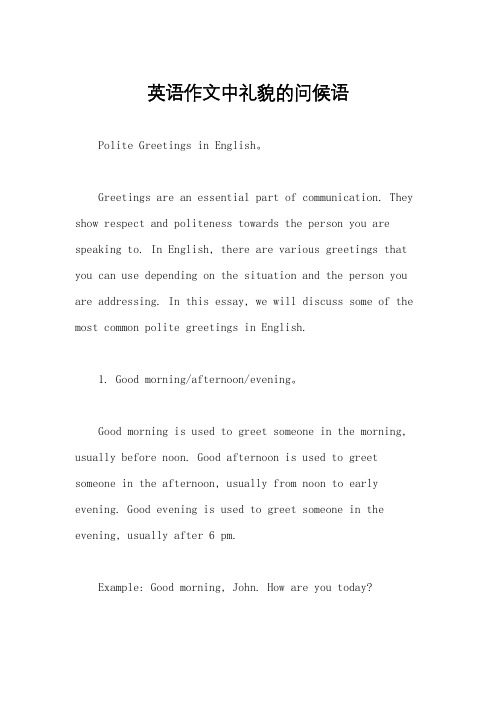
英语作文中礼貌的问候语Polite Greetings in English。
Greetings are an essential part of communication. They show respect and politeness towards the person you are speaking to. In English, there are various greetings that you can use depending on the situation and the person you are addressing. In this essay, we will discuss some of the most common polite greetings in English.1. Good morning/afternoon/evening。
Good morning is used to greet someone in the morning, usually before noon. Good afternoon is used to greet someone in the afternoon, usually from noon to early evening. Good evening is used to greet someone in the evening, usually after 6 pm.Example: Good morning, John. How are you today?2. Hello/Hi。
Hello and Hi are informal greetings that can be used in any situation. They are commonly used when meeting someone for the first time or when greeting friends and family.Example: Hi, Sarah. It's good to see you again.3. How do you do?How do you do is a formal greeting that is commonly used in business settings or when meeting someone for the first time. It is a polite way of asking how someone is doing.Example: How do you do, Mr. Smith? It's a pleasure to meet you.4. Nice to meet you。
礼貌用语英文作文
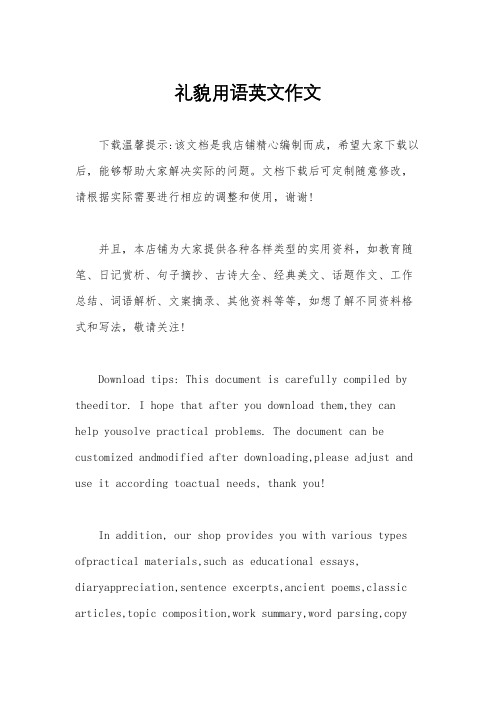
礼貌用语英文作文下载温馨提示:该文档是我店铺精心编制而成,希望大家下载以后,能够帮助大家解决实际的问题。
文档下载后可定制随意修改,请根据实际需要进行相应的调整和使用,谢谢!并且,本店铺为大家提供各种各样类型的实用资料,如教育随笔、日记赏析、句子摘抄、古诗大全、经典美文、话题作文、工作总结、词语解析、文案摘录、其他资料等等,如想了解不同资料格式和写法,敬请关注!Download tips: This document is carefully compiled by theeditor. I hope that after you download them,they can help yousolve practical problems. The document can be customized andmodified after downloading,please adjust and use it according toactual needs, thank you!In addition, our shop provides you with various types ofpractical materials,such as educational essays, diaryappreciation,sentence excerpts,ancient poems,classic articles,topic composition,work summary,word parsing,copyexcerpts,other materials and so on,want to know different data formats andwriting methods,please pay attention!Oh, excuse me. If you don't mind, could you please pass me that book? Thank you so much.Hey, I really appreciate your help. It means a lot to me.Well, that's really kind of you to say. I'm glad to hear that.Oh, sorry about that. I didn't mean to interrupt.。
问日期的礼貌用语英语作文

问日期的礼貌用语英语作文1. Hey! What's the date today? I totally forgot to check my calendar this morning.2. Oh, it's already the 15th? Time flies! I can't believe we're halfway through the month already.3. By the way, do you happen to know what day of the week it is? I feel like I've lost track of time.4. Wow, it's Friday already? That means the weekend is just around the corner. I can't wait!5. Speaking of dates, have you made any plans for the upcoming holidays? I'm thinking of going on a short trip.6. Did you know that today is a special date for me? It's my anniversary with my significant other. I'm so excited!7. I have a meeting scheduled for tomorrow, but I can't remember the exact date. Can you help me out?8. I need to mark an important event on my calendar,but I can't remember the exact date. Can you remind me?9. I'm trying to plan a surprise party for my friend,but I need to know their birthday. Can you tell me the date?10. I've been waiting for this date for so long! It's finally the release day of my favorite book/movie. I can't wait to get my hands on it!。
关于生活中的礼貌用语的英文短文
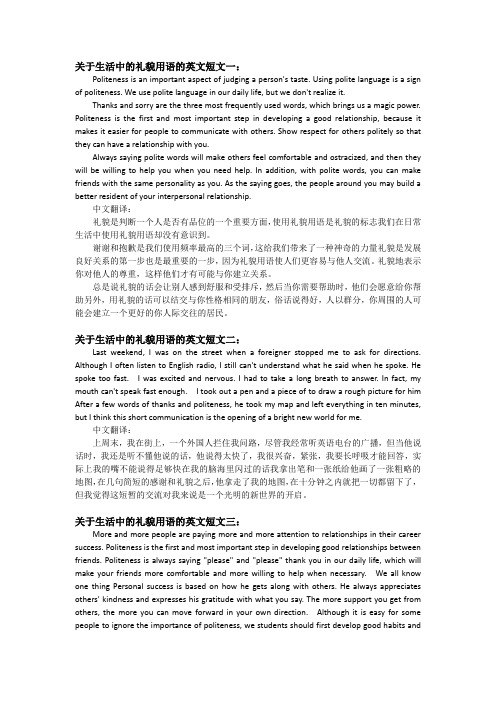
关于生活中的礼貌用语的英文短文一:Politeness is an important aspect of judging a person's taste. Using polite language is a sign of politeness. We use polite language in our daily life, but we don't realize it.Thanks and sorry are the three most frequently used words, which brings us a magic power. Politeness is the first and most important step in developing a good relationship, because it makes it easier for people to communicate with others. Show respect for others politely so that they can have a relationship with you.Always saying polite words will make others feel comfortable and ostracized, and then they will be willing to help you when you need help. In addition, with polite words, you can make friends with the same personality as you. As the saying goes, the people around you may build a better resident of your interpersonal relationship.中文翻译:礼貌是判断一个人是否有品位的一个重要方面,使用礼貌用语是礼貌的标志我们在日常生活中使用礼貌用语却没有意识到。
礼貌用语的英语作文
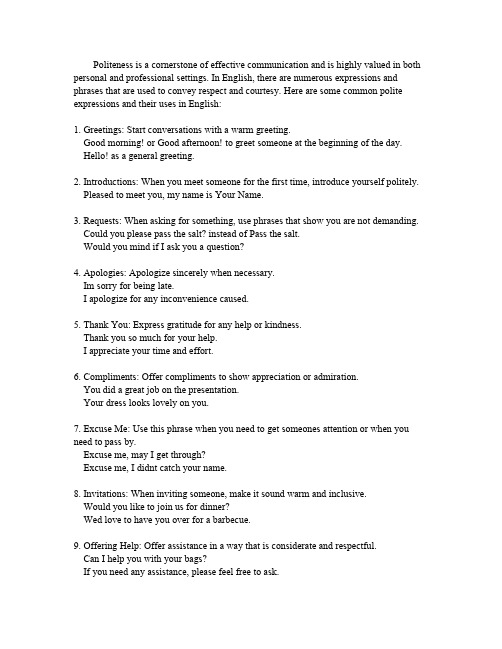
Politeness is a cornerstone of effective communication and is highly valued in both personal and professional settings.In English,there are numerous expressions and phrases that are used to convey respect and courtesy.Here are some common polite expressions and their uses in English:1.Greetings:Start conversations with a warm greeting.Good morning!or Good afternoon!to greet someone at the beginning of the day. Hello!as a general greeting.2.Introductions:When you meet someone for the first time,introduce yourself politely. Pleased to meet you,my name is Your Name.3.Requests:When asking for something,use phrases that show you are not demanding. Could you please pass the salt?instead of Pass the salt.Would you mind if I ask you a question?4.Apologies:Apologize sincerely when necessary.Im sorry for being late.I apologize for any inconvenience caused.5.Thank You:Express gratitude for any help or kindness.Thank you so much for your help.I appreciate your time and effort.pliments:Offer compliments to show appreciation or admiration.You did a great job on the presentation.Your dress looks lovely on you.7.Excuse Me:Use this phrase when you need to get someones attention or when you need to pass by.Excuse me,may I get through?Excuse me,I didnt catch your name.8.Invitations:When inviting someone,make it sound warm and inclusive.Would you like to join us for dinner?Wed love to have you over for a barbecue.9.Offering Help:Offer assistance in a way that is considerate and respectful.Can I help you with your bags?If you need any assistance,please feel free to ask.10.Agreement and Disagreement:Express your agreement or disagreement politely.I agree with you completely.I see your point,but I have a different perspective.11.Farewells:End conversations or meetings with a polite goodbye.It was nice talking to you,have a great day!Goodbye,and thank you for coming.ing Sir/Madam:Use these titles when addressing someone you dont know well or in a formal setting.Excuse me,Sir,could you help me with this?13.May I/Could I:Use these phrases to ask for permission or to do something.May I use your phone?Could I borrow your pen?14.Please:This simple word can turn a command into a polite request.Please close the door behind you.15.Would You Like:Use this phrase to offer something without being pushy.Would you like some tea?By incorporating these polite expressions into your daily English conversations,you can foster a positive and respectful atmosphere.Remember,the key to politeness is not just in the words you use,but also in your tone of voice and body language.。
当代年轻人礼貌英语作文
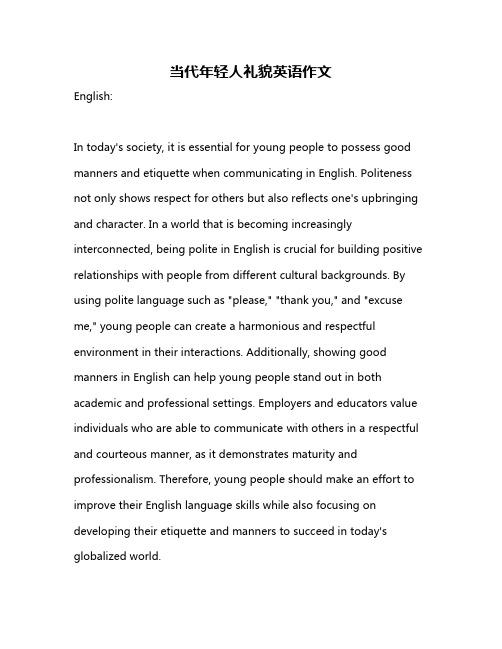
当代年轻人礼貌英语作文English:In today's society, it is essential for young people to possess good manners and etiquette when communicating in English. Politeness not only shows respect for others but also reflects one's upbringing and character. In a world that is becoming increasingly interconnected, being polite in English is crucial for building positive relationships with people from different cultural backgrounds. By using polite language such as "please," "thank you," and "excuse me," young people can create a harmonious and respectful environment in their interactions. Additionally, showing good manners in English can help young people stand out in both academic and professional settings. Employers and educators value individuals who are able to communicate with others in a respectful and courteous manner, as it demonstrates maturity and professionalism. Therefore, young people should make an effort to improve their English language skills while also focusing on developing their etiquette and manners to succeed in today's globalized world.Translated content:在当今社会,年轻人在用英语交流时拥有良好的礼貌和礼仪是至关重要的。
常见的礼貌用语英语作文

常见的礼貌用语英语作文Title: Common Polite Expressions in English。
Politeness is an essential aspect of communication in any language. It not only reflects one's respect for others but also helps in building positive relationships. In English, there are numerous polite expressions that are commonly used in various social situations. These expressions play a significant role in facilitating smooth interactions and conveying goodwill. Let's explore some of the most common polite expressions in English.1. Greetings and Salutations:Hello: A universal greeting used to initiate conversations.Good morning/afternoon/evening: These greetings are time-specific and show consideration for the time of day.Hi: Informal greeting commonly used among friends and acquaintances.2. Expressing Gratitude:Thank you: A fundamental expression of gratitude.Thanks a lot/Thanks so much: Expresses deeper appreciation.I appreciate it/I'm grateful: Shows sincere gratitude for someone's actions or help.Thank you for your time: Acknowledges someone's investment of time.3. Apologizing and Excusing:I'm sorry: Used to express regret or to apologize for a mistake.Excuse me: Used to politely interrupt or getsomeone's attention.Pardon me: Similar to "excuse me," used to apologize or ask for forgiveness.I beg your pardon: A more formal way of apologizing or asking for clarification.4. Making Requests:Please: A polite word used to make requests or ask for favors.Could you...?/Would you mind...?/Can you...?: Polite ways to ask for assistance or favors.If you don't mind: Used to politely inquire if someone is comfortable with something.5. Offering Assistance:Can I help you?/Is there anything I can do for you?:Offers assistance or help.Let me know if you need anything: Shows willingness to assist in the future.6. Expressing Polite Agreement or Disagreement:Certainly/Sure: Indicates agreement or affirmation.I'm afraid/I'm sorry, but: Used to politely disagree or decline.I see what you mean: Indicates understanding, evenif you don't necessarily agree.7. Wishing Well:Have a nice day/weekend: Wishes someone well for the day or weekend.Take care: Expresses concern for someone's well-being.Good luck: Wishes someone success or good fortune.8. Closing Remarks:Goodbye/Goodbye for now: Formal or informal way to bid farewell.See you later/See you soon: Indicates anticipation of meeting again.Take care of yourself: A caring way to end a conversation.In conclusion, mastering polite expressions in English is crucial for effective communication and buildingpositive relationships. Whether in formal or informal settings, using these expressions demonstrates respect, consideration, and goodwill towards others. By incorporating these expressions into your daily interactions, you can enhance your communication skills andcreate a more pleasant environment for yourself and those around you.。
公共场所礼貌用语英语作文
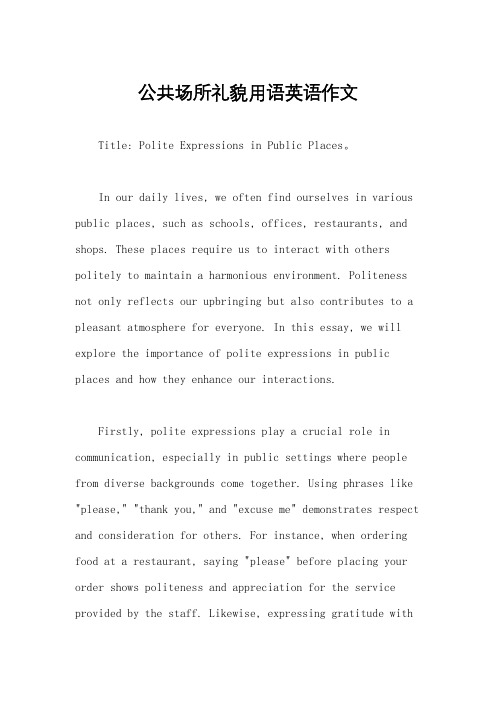
公共场所礼貌用语英语作文Title: Polite Expressions in Public Places。
In our daily lives, we often find ourselves in various public places, such as schools, offices, restaurants, and shops. These places require us to interact with others politely to maintain a harmonious environment. Politeness not only reflects our upbringing but also contributes to a pleasant atmosphere for everyone. In this essay, we will explore the importance of polite expressions in public places and how they enhance our interactions.Firstly, polite expressions play a crucial role in communication, especially in public settings where people from diverse backgrounds come together. Using phrases like "please," "thank you," and "excuse me" demonstrates respect and consideration for others. For instance, when ordering food at a restaurant, saying "please" before placing your order shows politeness and appreciation for the service provided by the staff. Likewise, expressing gratitude witha "thank you" when receiving assistance or a service acknowledges the efforts of others and fosters a positive atmosphere.Moreover, polite expressions help to build rapport and strengthen interpersonal relationships. When we use polite language, it not only conveys our manners but also makes others feel valued and respected. For example, addressing someone with "excuse me" before asking a question or seeking their attention shows courtesy and avoids appearing intrusive. Additionally, offering polite responses such as "you're welcome" or "my pleasure" in return to expressions of gratitude creates a sense of mutual respect and goodwill between individuals.Furthermore, polite expressions contribute to effective teamwork and collaboration in professional environments. In workplaces, using courteous language fosters a conducive atmosphere for cooperation and productivity. Simple gestures like saying "please" when requesting assistance from colleagues or acknowledging their contributions with a "thank you" can significantly improve morale and teamwork.Additionally, using polite expressions during discussions or meetings promotes a respectful exchange of ideas and ensures that everyone's opinions are valued.In educational institutions, polite expressions play a vital role in shaping students' behavior and fostering a culture of respect. Teachers often encourage students to use phrases like "may I" instead of "can I" to request permission, instilling in them the importance of politeness and consideration for others' feelings. Similarly, addressing peers and teachers with courtesy and using expressions like "excuse me" during classroom interactions teaches students valuable communication skills that are essential for their personal and professional development.In public places such as shopping centers or transportation hubs, polite expressions help to maintain order and ensure smooth operations. Queuing patiently and using phrases like "after you" or "please go ahead" demonstrate respect for others' time and space, preventing conflicts or misunderstandings. Additionally, offering assistance to those in need and expressing appreciation forsmall acts of kindness with a simple "thank you" fosters a sense of community and goodwill among strangers.In conclusion, polite expressions are integral to effective communication and social interaction in public places. By incorporating phrases like "please," "thank you," and "excuse me" into our daily interactions, we not only demonstrate our manners but also contribute to a more respectful and harmonious environment for everyone. Whether in schools, workplaces, or recreational spaces, polite expressions play a crucial role in fostering positive relationships and creating a sense of unity within our communities. Therefore, let us strive to cultivate aculture of politeness and consideration in all our interactions, both in public places and in our everyday lives.。
英语礼貌用语作文
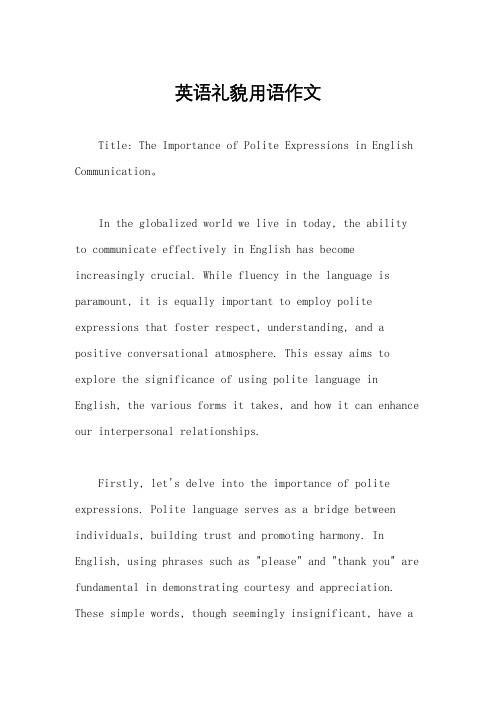
英语礼貌用语作文Title: The Importance of Polite Expressions in English Communication。
In the globalized world we live in today, the ability to communicate effectively in English has become increasingly crucial. While fluency in the language is paramount, it is equally important to employ polite expressions that foster respect, understanding, and a positive conversational atmosphere. This essay aims to explore the significance of using polite language in English, the various forms it takes, and how it can enhance our interpersonal relationships.Firstly, let's delve into the importance of polite expressions. Polite language serves as a bridge between individuals, building trust and promoting harmony. In English, using phrases such as "please" and "thank you" are fundamental in demonstrating courtesy and appreciation. These simple words, though seemingly insignificant, have aprofound impact on the tone and tenor of a conversation. They convey a sense of politeness that makes the speaker appear more approachable and kind.Moreover, polite expressions are crucial inprofessional settings. In the workplace, where precisionand clarity are paramount, polite language ensures that messages are communicated effectively while maintaining a level of professionalism. For instance, when requesting a colleague's assistance, using phrases like "Could youplease assist me with this task?" rather than "Do this for me" is more likely to elicit a positive response. Such expressions acknowledge the other person's time and efforts, fostering。
宣传礼貌用语英语作文

宣传礼貌用语英语作文Title: Politeness in Communication: An Essential Aspect of Effective Communication。
In today's interconnected world, effective communication is crucial for success in various aspects of life. Whether it's in personal relationships, professional settings, or public interactions, the use of polite language plays a significant role in fostering positive communication and building meaningful connections. In this essay, we will explore the importance of polite language in communication and discuss various polite expressions commonly used in English.First and foremost, politeness in communication helps to create a respectful and harmonious environment. When individuals use polite language, they demonstrate consideration and regard for others' feelings and perspectives. This fosters goodwill and enhances interpersonal relationships. Politeness acts as a lubricantin social interactions, smoothing out potential conflicts and promoting mutual understanding.In English, there are numerous expressions and phrases that convey politeness and courtesy. These expressions are often used in different contexts, such as greetings, requests, apologies, and expressions of gratitude. Let's delve into some of these polite expressions and their appropriate usage:1. Greetings:"Good morning/afternoon/evening" These are common greetings used to acknowledge someone politely based on the time of day."Hello" or "Hi" Simple yet polite ways to initiate a conversation.2. Requests:"Could you please...?" This phrase softens a request,making it more polite and respectful."Would you mind...?" Similarly, this phrase is used to ask for something in a polite manner.3. Apologies:"I'm sorry" A straightforward apology expressing regret or remorse."Pardon me" or "Excuse me" Used to apologize for interrupting or to seek forgiveness for a mistake.4. Expressions of Gratitude:"Thank you" A simple yet powerful way to express appreciation."I appreciate your help/time/effort" Conveys a deeper level of gratitude and acknowledges the specific contribution of the other person.In addition to these specific phrases, using a friendly and respectful tone in communication also contributes to politeness. It's essential to pay attention not only to what we say but also to how we say it. Tone of voice, body language, and facial expressions all play a part in conveying politeness and sincerity.Furthermore, cultural differences should be taken into account when communicating politely. What may be considered polite in one culture could be perceived differently in another. Therefore, it's essential to be mindful ofcultural nuances and adapt one's communication style accordingly, especially in multicultural environments.In conclusion, the use of polite language is a fundamental aspect of effective communication. Politeness fosters respect, understanding, and cooperation in interactions with others. By incorporating polite expressions and maintaining a respectful demeanor, individuals can enhance the quality of their relationships and create positive experiences in both personal and professional settings. Let us strive to communicate withkindness and consideration, making the world a more harmonious place, one polite interaction at a time.。
宣传礼貌用语英语作文

宣传礼貌用语英语作文Title: Politeness in Communication: A Key to Effective Public Relations。
In today's globalized world, effective communication plays a crucial role in building relationships, fostering understanding, and achieving success in various spheres of life. One essential aspect of communication is the use of polite language, especially in public relations (PR) and promotional activities. Politeness not only reflects positively on individuals and organizations but also enhances the effectiveness of the message being conveyed. In this essay, we will explore the significance of using polite language in promotional contexts and provide examples of courteous expressions commonly used in English.Firstly, politeness in communication establishes a positive image for individuals and organizations. Whetherit's in advertising, marketing, or customer service, using polite language demonstrates respect for the audience andreflects professionalism. For instance, instead of simply stating, "Buy our product now," a more polite andpersuasive approach would be, "We would be delighted if you considered trying our product." This subtle shift in language can make a significant difference in how the message is received, portraying the company as courteousand customer-centric.Moreover, politeness fosters goodwill and buildsrapport with the target audience. In promotional activities, the goal is not just to sell a product or service but alsoto create lasting relationships with customers. Polite language helps in achieving this objective by making individuals feel valued and appreciated. For example, using phrases like "Thank you for your interest" or "Weappreciate your support" acknowledges the customer's contribution and encourages further engagement.Furthermore, politeness can mitigate conflicts and defuse tense situations in PR scenarios. In cases where customers express dissatisfaction or raise concerns, responding with polite and empathetic language can help tocalm the situation and find a resolution amicably. Instead of dismissing complaints outright, PR professionals can use phrases such as "We apologize for any inconvenience caused" or "Please allow us to address your concerns promptly." This demonstrates a willingness to listen and a commitment to customer satisfaction, thereby preserving the brand's reputation.In addition to verbal communication, non-verbal cues such as tone of voice and body language also play a significant role in conveying politeness. When interacting with customers or stakeholders, maintaining a friendly and respectful tone is essential. Similarly, using appropriate gestures and maintaining eye contact conveys sincerity and attentiveness, enhancing the overall impact of the message.Now, let's explore some common polite expressions used in promotional contexts:1. "Please feel free to contact us if you have any questions or concerns."2. "We appreciate your patience and understanding."3. "Thank you for considering our product/service."4. "Your feedback is invaluable to us."5. "We apologize for any inconvenience caused and assure you of our prompt attention to the matter."6. "We sincerely appreciate your support."7. "It was a pleasure serving you."8. "We value your opinion and will take it into consideration."In conclusion, politeness is not merely a formality but a powerful tool in communication, particularly in PR and promotional activities. By using courteous language and gestures, individuals and organizations can create a positive impression, foster goodwill, and build strong relationships with their audience. In today's competitivemarketplace, where customer experience is paramount, mastering the art of politeness can make all the difference in achieving success.。
英语礼貌用语范文
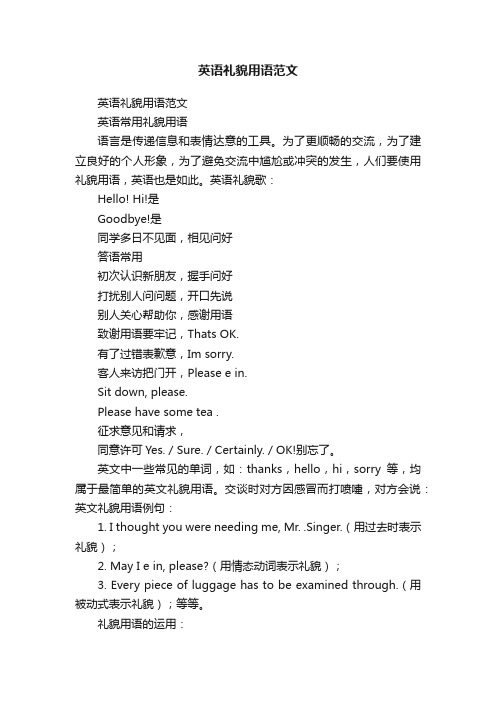
英语礼貌用语范文英语礼貌用语范文英语常用礼貌用语语言是传递信息和表情达意的工具。
为了更顺畅的交流,为了建立良好的个人形象,为了避免交流中尴尬或冲突的发生,人们要使用礼貌用语,英语也是如此。
英语礼貌歌:Hello! Hi!是Goodbye!是同学多日不见面,相见问好答语常用初次认识新朋友,握手问好打扰别人问问题,开口先说别人关心帮助你,感谢用语致谢用语要牢记,Thats OK.有了过错表歉意,Im sorry.客人来访把门开,Please e in.Sit down, please.Please have some tea .征求意见和请求,同意许可Yes. / Sure. / Certainly. / OK!别忘了。
英文中一些常见的单词,如:thanks,hello,hi,sorry等,均属于最简单的英文礼貌用语。
交谈时对方因感冒而打喷嚏,对方会说:英文礼貌用语例句:1. I thought you were needing me, Mr. .Singer.(用过去时表示礼貌);2. May I e in, please?(用情态动词表示礼貌);3. Every piece of luggage has to be examined through.(用被动式表示礼貌);等等。
礼貌用语的运用:Can you pass me...? vs Give me...人们不喜欢别人支配他们去做事情,因此有时想直接得到你想要的可不是那么简单。
换掉那些听起来是命令的语句,例如Could you give me five minutes? vs Go away.你工作非常的忙,但是你的同事却请你帮忙。
当你工作非常紧张而不能做其他的事情的时候,只说Excuse me. vs Move.让别人Im afraid I cant. vs No.有时侯要拒绝一个朋友的邀请非常的困难。
只说I would like... vs I want...用下面的词表示请求常常被认为很不礼貌,Would you mind...? vs Stop it!如果有人做你不喜欢的事,而且可能还很不礼貌?你该怎样阻止他们呢?要想得到理想中的结果,不用大声叫嚣Can you hold, please? vs Wait.在电话中是否选择适当礼貌用语可以使对话更有效或中止对话。
- 1、下载文档前请自行甄别文档内容的完整性,平台不提供额外的编辑、内容补充、找答案等附加服务。
- 2、"仅部分预览"的文档,不可在线预览部分如存在完整性等问题,可反馈申请退款(可完整预览的文档不适用该条件!)。
- 3、如文档侵犯您的权益,请联系客服反馈,我们会尽快为您处理(人工客服工作时间:9:00-18:30)。
英语礼貌用语范文英语常用礼貌用语语言是传递信息和表情达意的工具。
为了更顺畅的交流,为了建立良好的个人形象,为了避免交流中尴尬或冲突的发生,人们要使用礼貌用语,英语也是如此。
英语礼貌歌:Hello! Hi!是Goodbye!是同学多日不见面,相见问好答语常用初次认识新朋友,握手问好打扰别人问问题,开口先说别人关心帮助你,感谢用语致谢用语要牢记,Thats OK.有了过错表歉意,Im sorry.客人来访把门开,Please e in.Sit down, please.Please have some tea .征求意见和请求,同意许可Yes. / Sure. / Certainly. / OK!别忘了。
英文中一些常见的单词,如:thanks,hello,hi,sorry等,均属于最简单的英文礼貌用语。
交谈时对方因感冒而打喷嚏,对方会说:英文礼貌用语例句:1. I thought you were needing me, Mr. .Singer.(用过去时表示礼貌);2. May I e in, please?(用情态动词表示礼貌);3. Every piece of luggage has to be examined through.(用被动式表示礼貌);等等。
礼貌用语的运用:Can you pass me...? vs Give me...人们不喜欢别人支配他们去做事情,因此有时想直接得到你想要的可不是那么简单。
换掉那些听起来是命令的语句,例如Could you give me five minutes? vs Go away.你工作非常的忙,但是你的同事却请你帮忙。
当你工作非常紧张而不能做其他的事情的时候,只说Excuse me. vs Move.让别人Im afraid I cant. vs No.有时侯要拒绝一个朋友的邀请非常的困难。
只说I would like... vs I want...用下面的词表示请求常常被认为很不礼貌,Would you mind...? vs Stop it!如果有人做你不喜欢的事,而且可能还很不礼貌?你该怎样阻止他们呢?要想得到理想中的结果,不用大声叫嚣Can you hold, please? vs Wait.在电话中是否选择适当礼貌用语可以使对话更有效或中止对话。
如果有人打电话来找人,不要说,Glad to meet you here. 很高兴见到你。
我们常常会听到对方说How do you do?这时唯一正确的反应也是How do you do?不要以为对方要问你什么,其实这只是一个问句式的问候语。
如果你告诉对方哪儿痛哪儿不舒服就错了,我们不少人喜欢说 Im fine, thank you.这是不符合习惯的。
另外提一句,我们初次见面分手时喜欢说 Good-bye.你如果仔细注意的话,会发现Native speakers说Nice meeting you 或Nice to have met you。
在学校和公司早晨见面大家打招呼时说:Good Morning! 早晨好!Morning ! 早晨好!如果你们以前曾经见过面,再次相见可以说:Good to see you again. 很高兴再次见到你。
英语礼貌用语的特点:青岛外事办时间:xx-4-25礼貌用语是人们在日常工作和人际交往中的一个重要部分,它反映一个国家的文明程度和民众的素质。
礼貌用语(或称委婉表达法),是纯正英语的特色之一。
这种以简单明快而见长的语言,表达力强,同时使听者感到愉快、舒服,可称为语言的润滑剂。
随着我国改革开放的蓬勃发展,国际交往迅速增多,礼貌用语的重要性日益凸现,值得认真探索。
一多年前,在我国国际航班的广播中听到这样的句子:PASSENGERS MUST PAY ATTENTION TO THE FOLLOWING REGULATIONS, 宣布上机后乘客必须遵守飞行时的某些规定,口气十分生硬。
如改为:Passengers are kindly requested to observe the following regulations, 口气就客气和礼貌得多,很容易为外国旅客理解和接受。
要宣布事情,不要直截了当地说 ATTENTION EVERYBODY, 如果表达为:may I have your attention please, ladies and gentlemen?就非常得体。
我国译员和服务行业都存在类似的问题。
笔者乘坐外国飞机时,发现礼貌用语随处可闻可见。
如:请乘客保持盥洗室脸盆清洁时,贴有下述标志:AS A COURTESY TO THE NEXT PASSENGER, MAY WE SUGGEST THAT YOU CLEAN THE BASIN WITH THE TOWEL YOU HAVE BEEN USING.(为照顾其他旅客,竭诚建议您用刚用过的清洁纸把脸盆擦干净)。
在广播中请旅客在飞机完全停稳之前不要离开座位,是这么说的:Passengers are kindly requested to remain seated until the aircraft es to a plete halt.客气地使用语言,是欧美文化的重要组成部分,外国人对这点是很敏感的。
要求对方做某某事时,往往使用下述句型: Will you…….? Would you like to……? Would you mind doing something? I wonder if you would……would you be so kind as to ……. I would begrateful if…….. I would appreciate it if …….,如:will you follow me and go this way please?显然不是问句,而是导游客气地请客人跟他走。
SIR……WOULD YOU LIKE TO SIT BESIDE LADY……,PLEASE?请客人按主人的安排就座,并非征求意见。
Would you mind answering a few personal questions? 考官客气地问面试者一些个人问题。
I wonder if you could do me a favor by posting the letter in the post office on your way home. 请人顺路代寄一封信。
We could be most grateful (or much obliged, appreciate it )if you kindly let us know your ments at your early convenience,请客户及早赐告对产品的意见。
这一句型在外事文书上有得尤多。
二国外政府机构和公司企业的秘书往往使用一套规范用语,值得学习。
他们接电话时,先以问候和自报单位开始,如:GOOD MORNING,THIS IS BHP GENERALMANAGER?S OFFICE,接着马上问:MAY I HELP YOU? 或 IS THERE ANYTHING I CAN DO FOR YOU?需要问清对方身份时,除了用WHO IS CALLING PLEASE?还可以说,MAY I TELL OUR GM WHO IS CALLING? 显得更委婉客气。
如对方想找的人不在,先答:SORRY,MR. XXX IS NOT IN. 还可以解释:MR.XXX IS AWAY ON A BUSINESS TRIP. 或HE IS ON VACATION FOR A COUPLE OF WEEKS.还可以进一步表示:BUT I?LL LET HIM KNOW THAT YOU CALLED AS SOON AS HERETURNS,也可以问:WOULD YOU LIKE TO LEAVE A MESSAGE?使人感到这位秘书热情而又负责。
对方查询某情况时,WAIT A SECOND 或 HOLD ON,PLEASE.是一种答复。
更客气的回答是:DO YOU MIND WAITING A FEW SECONDS WHILE I CHECK THAT FOR YOU?(我查一下,请稍等几秒钟可以吗?)查出告诉对方后,往往再加上一句:THANK YOU FOR WAITING 或 SORRY TO HAVE KEPT YOU WAITING. (谢谢,对不起让您等候了。
)对不是自己主管的事,从不一推了事,而是耐心提供线索,不要用:YOU HAVE TO ASK…….FOR THAT,而用以下词句:AS FAR AS I AM AWARE,MR…….OF THE…….OFFICE IS IN CHARGE OF THAT. I?M SURE HE?LL BE GLAD TO HELP YOU IF YOU RING…….真是礼多人不怪,服务周到之至。
一方在电梯上不慎踩碰了对方,双方往往同时说 I AM SORRY,对方从不会去责怪一方,所以说,礼貌用语是人际关系的润滑剂。
使用礼貌的电话用语,重要的是避免使用命令句,如不用YOU MUST, YOU HAVE TO, IT?S NECESSARY FOR YOU TO…….,YOU?D BETTER ASK MR…….,但可用IT MIGHT BE BETTER IF……三在表示婉拒,发表不同意见和看法时,也大有讲究。
宜避免单刀直入和太直截了当,要迂回地缓和语气,使对方不感唐突和尴尬,婉拒时说:I AM AFRAID THAT I WILL BE UNABLE TO E AS I ALREADY HAVE A PRIOR MITMENT ON THAT DAY, THANK YOU ALL THE SAME. (因事先已另有约会,无法应邀,但仍感谢盛情邀请),类似的表达法还有:I?D LOVE TO, BUT I HAVE A PRIOR APPOINTMENT, I WISH I COULD,BUT MY MOTHER IS ING THIS EVENING,THAT?S VERY KIND OF YOU,BUT I?LL HAVE AN EXAM TOMORROW 或I?M TERRIBLYSORRY,I DON?T THINK I CAN BECAUSE……,在书面答复中,先感谢邀请,接着表示…….REGRETS THAT……(遗憾地表示无法出席)。
当对方突然提出某种要求,希望在短时间内办到,使听者很为难,但又不宜断然拒绝,可委婉地先吹吹冷风,先档一下:I AM NOT SURE WHETHER THAT CAN BE ARRANGED AT SUCH SHORT NOTICE. IN ANY CASE,I?LL ASK AND RING YOU UP BEFORE LONG..即:通知时间这么短,我对能否办成实无把握,但表示可以问一下上级再复,使对方有了此事可能办不成的思想准备,但答复很客气。
